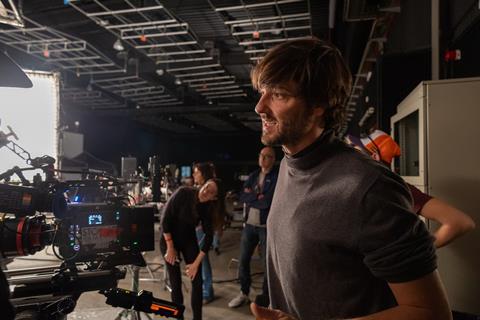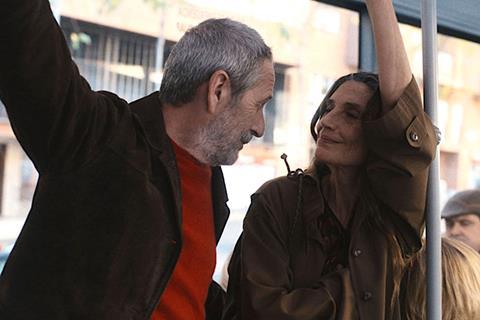
Spanish director Carlos Marques-Marcet’s musical drama They Will Be Dust is the story of woman who embarks on a one-way journey to Switzerland after being diagnosed with a terminal illness.
Starring Ángela Molina, daughter of Spanish musical legend Antonio Molina, whose credits include Blancanieves and The Last Breath, and Chile’s Alfredo Castro, with Spanish theatre actress Mònica Almirall making her debut as the couple’s daughter, the film won the Platform prize, the only juried award at this year’s Toronto International FIlm Festival.
It is produced by Spain’s Lastor Media with Switzerland’s Alina Film and Italy’s Kino Produzioni, and is being sold internationally by Latido Films. Elastica Films is releasing the film in Spain on November 15.
The Will Be Dust is Marques-Marcet’s fourth film following his 2014 debut 10,000KM, Anchor & Hope (2017) and The Days To Come (2019). It is written by Marques-Marcet with his long-time collaborator Clara Roquet and Coral Cruz.
Marques-Marcet tells Screen about the original process that inspired the film, his love of Hollywood musicals and why he chose to make the film as a music.
Why did you decide to talk about a terminal illness and death through a musical?
I think a lot about death. My grandmother died when I started working on the project. Then I found out about this life — or end of life — plan this couple I knew had in mind, and went ahead with the story. I have never made autobiographical films, but I get inspired by stories that surround me. I started working with a couple of friends of mine in an acting workshop. We rehearsed for a long time, and I took about 400 pages of notes that were the source material for the screenplay. But because of ill health we could not carry though the original project. It then evolved into the film we have now, starring Ángela Molina and Alfredo Castro.
The inspiration to do a musical also came from the first rehearsing sessions with these friends of mine that often ended putting some music on or dancing. Most cultures include music when facing death. Music helps you convey what you cannot express with words.

What were your musical references?
I adore classic Hollywood musicals of the golden age by the likes of Stanley Donen, Gene Kelly, Vincent Minnelli and — a director that never gets enough credit — Charles Walters, but also filmmakers from the 1930s like Busby Berkeley and Mark Sandrich who directed Fred Astaire and Ginger Rogers. This said, my film is not a classic approach to the musical, but I wanted to avoid irony which is a tendency in contemporary cinema. It seems that they don’t take themselves seriously enough.
Making a musical was a bit intimidating, but I really enjoyed the experience. The film has to do with how we want to face our own death. There are a lot of films that have to do with grief, with dealing with the death of a loved one, but this is about thinking about not being here anymore. It’s such an abstract concept that the idea of doing it as a musical made sense. I was also interested in characters that make a decision when confronted with a terminal illness. It’s a vitalist approach to our own fate.
Did it take longer than usual to get the film made?
They Will Be Dust was a very ambitious project and we needed to co-produce and access different international public funds. This inevitably makes the process a bit longer, but we made the film we wanted to and that’s key. We are very happy. The spotlight and the award we got in Toronto has been a boost for the international career of They Will Be Dust, and now we have the opportunity to premiere the film in Valladolid ready for its release in Spain.
Relationships between couples or families are at the core of your films. Why were you drawn to a more mature couple?
I don’t think it has been a conscious process, but I do have a tendency to explore the intimate world of the couple as a way of reflecting on wider issues. Also, I think that as you get more experience as a director, you get more comfortable talking about worlds that are not so close to you. With They Will Be Dust I also wanted to try something different from a filmmaking point of view.























No comments yet